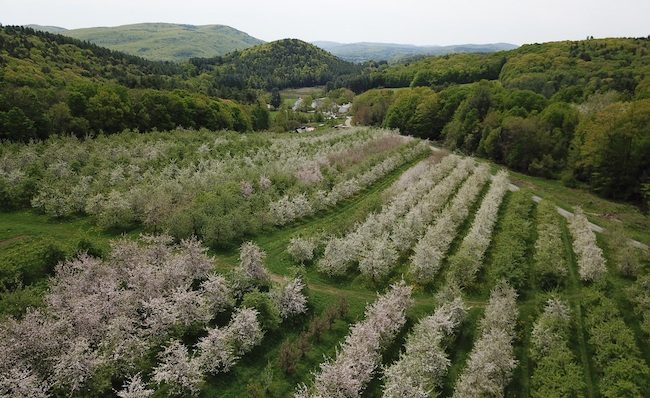
It’s that time of year again. We’re excited to announce the 2019 FruitGuys Community Fund Grantees! There were many notable applicants, making selection a tough choice for our grant review committee. We received an incredible 318 letters of intent this year, which were narrowed down to 21 finalists using the criteria laid out in our farming manifesto. After much deliberation, we selected the following 15 farms and agricultural nonprofits from 12 different states, making 2019 our largest and most diverse class so far! These 15 grantees will receive a total $53,471.96 in funding, thanks in part to our generous supporters.
As the season progresses, we’ll watch these farms utilize their funding to complete sustainability projects, like adding swales, beehives, rain barrels, and vermicomposting systems. These projects will help them make positive changes in their communities.
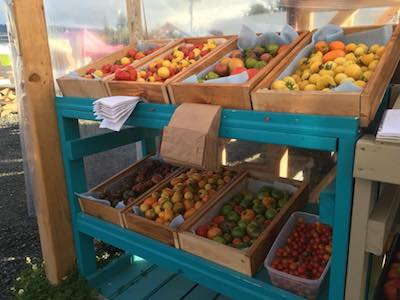 Wilderness Greenhouse, a 1-acre farm near Homer, AK, produces tomatoes, cucumbers, fresh salsas, edible hanging baskets, and other seasonal vegetables. They strive to increase local food production because their remote, rural community sometimes faces limited access to fresh produce. Their $2,135.62 will allow them to expand their water catchment system, purchase cover crop seeds, set up a vermicomposting system, and transition to Korean natural farming methods. These changes will help improve their soil health and conserve water as they expand their operations.
Wilderness Greenhouse, a 1-acre farm near Homer, AK, produces tomatoes, cucumbers, fresh salsas, edible hanging baskets, and other seasonal vegetables. They strive to increase local food production because their remote, rural community sometimes faces limited access to fresh produce. Their $2,135.62 will allow them to expand their water catchment system, purchase cover crop seeds, set up a vermicomposting system, and transition to Korean natural farming methods. These changes will help improve their soil health and conserve water as they expand their operations.
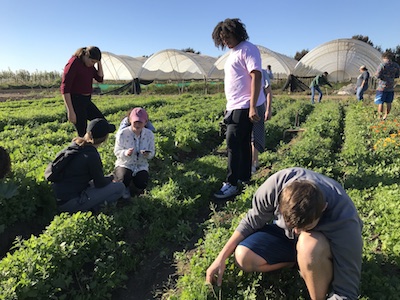 Robina’s Organics, a 1-acre farm in Salinas, CA, practices an agroecological model of farming that produces mixed vegetables and specialty Asian greens and herbs. They also host a four-month, university student training that focuses on climate change and agriculture. Their $4,500 grant will allow them to install a small hoop house and further invest in natural pest control and pollinator habitation. These projects will help Robina’s produce more food and allow students to experience working with a longer growing season.
Robina’s Organics, a 1-acre farm in Salinas, CA, practices an agroecological model of farming that produces mixed vegetables and specialty Asian greens and herbs. They also host a four-month, university student training that focuses on climate change and agriculture. Their $4,500 grant will allow them to install a small hoop house and further invest in natural pest control and pollinator habitation. These projects will help Robina’s produce more food and allow students to experience working with a longer growing season.
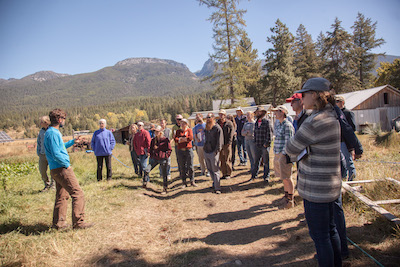 Fresh Roots Farm, a 5-acre farm in Polson, MT, produces certified organic vegetables, fruits, and seeds. They received a $3,725 grant that will allow them to convert their Allis Chalmers G tractor to 48v electric. As they already have a solar array, this project will significantly reduce their reliance on fossil fuels and allow the farm to operate more ecologically.
Fresh Roots Farm, a 5-acre farm in Polson, MT, produces certified organic vegetables, fruits, and seeds. They received a $3,725 grant that will allow them to convert their Allis Chalmers G tractor to 48v electric. As they already have a solar array, this project will significantly reduce their reliance on fossil fuels and allow the farm to operate more ecologically.
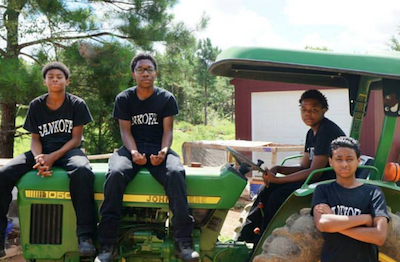 Sankofa Farms, a 2-acre farm in Cedar Grove, NC, produces vegetables, chicken, quail, and duck eggs, and seeks to create a sustainable food source for those in both rural and urban parts of North Carolina. They also run a year long agricultural program targeting at risk black males in Durham/Orange County, NC, that focuses on regenerative agriculture, discipline, and communal responsibility. Their $2,900.39 grant will allow them to increase their honey bee production and purchase a caterpillar tunnel and low tunnel supplies, which will be used in both their educational programs and to help provide additional food to local communities.
Sankofa Farms, a 2-acre farm in Cedar Grove, NC, produces vegetables, chicken, quail, and duck eggs, and seeks to create a sustainable food source for those in both rural and urban parts of North Carolina. They also run a year long agricultural program targeting at risk black males in Durham/Orange County, NC, that focuses on regenerative agriculture, discipline, and communal responsibility. Their $2,900.39 grant will allow them to increase their honey bee production and purchase a caterpillar tunnel and low tunnel supplies, which will be used in both their educational programs and to help provide additional food to local communities.
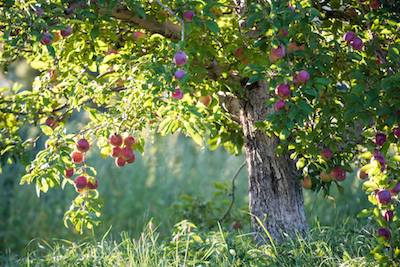 Scott Farm is a 40-acre farm in Dummerston, VT, that began cultivating in 1791. They grow heirloom fruit (mostly apples), which they sell at their farm market and to wholesale co-ops, markets, and distributors, including The FruitGuys! Scott Farm has been working toward transitioning from rented honeybee hives to native bees. They received a $2,211.54 grant that will allow them to create six bee hotels and add pollinator plantings to their orchard. Their hope is that these new additions will also help educate the public about pollinator importance. They plan to feature their projects on educational tours during the 2019 Vermont Farm Days.
Scott Farm is a 40-acre farm in Dummerston, VT, that began cultivating in 1791. They grow heirloom fruit (mostly apples), which they sell at their farm market and to wholesale co-ops, markets, and distributors, including The FruitGuys! Scott Farm has been working toward transitioning from rented honeybee hives to native bees. They received a $2,211.54 grant that will allow them to create six bee hotels and add pollinator plantings to their orchard. Their hope is that these new additions will also help educate the public about pollinator importance. They plan to feature their projects on educational tours during the 2019 Vermont Farm Days.
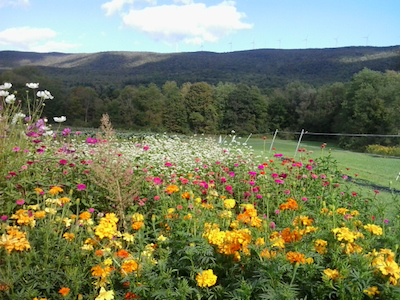 Many Forks Farm is a 7.5-acre farm in Massachusetts that produces vegetables, herbs, flowers, mushrooms, ginger, and berries, which are distributed through a CSA, farmers markets, Friendship Center Food Pantry, and the Berkshire Food Project free-lunch program. In recent years they’ve faced drainage problems in some of their fields due to changing weather patterns. Their $4,070 grant will allow them to create swales and berms planted with native perennials to improve drainage and provide habitat for beneficial insects. These techniques will be showcased during visits from local schools, aspiring farmers, and the general public.
Many Forks Farm is a 7.5-acre farm in Massachusetts that produces vegetables, herbs, flowers, mushrooms, ginger, and berries, which are distributed through a CSA, farmers markets, Friendship Center Food Pantry, and the Berkshire Food Project free-lunch program. In recent years they’ve faced drainage problems in some of their fields due to changing weather patterns. Their $4,070 grant will allow them to create swales and berms planted with native perennials to improve drainage and provide habitat for beneficial insects. These techniques will be showcased during visits from local schools, aspiring farmers, and the general public.
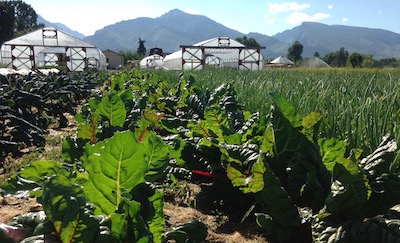 SweetRoot Farm is a 3-acre farm in Hamilton, MT, that produces eggs along with a wide range of vegetables, herbs, flowers, and berries. They received a $2,288 grant that will allow them to purchase cover crop seeds and sprinklers, which will improve their soil health and provide food and habitat for beneficial insects. Including gardens in cover crops will also provide a conversation starter to help educate customers and visitors about sustainable farming techniques.
SweetRoot Farm is a 3-acre farm in Hamilton, MT, that produces eggs along with a wide range of vegetables, herbs, flowers, and berries. They received a $2,288 grant that will allow them to purchase cover crop seeds and sprinklers, which will improve their soil health and provide food and habitat for beneficial insects. Including gardens in cover crops will also provide a conversation starter to help educate customers and visitors about sustainable farming techniques.
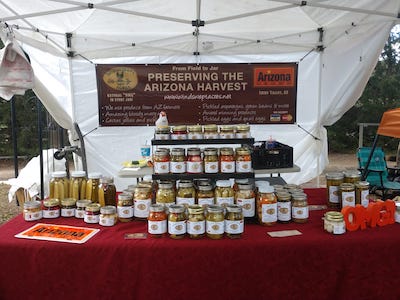 Windswept Acres, a veteran-owned 3-acre farm in Chino Valley, AZ, grows and pickles a variety of vegetables, which they sell at farmers markets. Their $4,885.20 grant will allow them to complete two hoop houses to extend their growing season, plant pollinator-friendly perennials, and add beehives. Season extension would provide more produce for farmers markets, as well as donations to local organizations, such as Cornucopia, The American Legion, the Paulden Food Bank, and the Squash Patch Farms Ministry food-connect program.
Windswept Acres, a veteran-owned 3-acre farm in Chino Valley, AZ, grows and pickles a variety of vegetables, which they sell at farmers markets. Their $4,885.20 grant will allow them to complete two hoop houses to extend their growing season, plant pollinator-friendly perennials, and add beehives. Season extension would provide more produce for farmers markets, as well as donations to local organizations, such as Cornucopia, The American Legion, the Paulden Food Bank, and the Squash Patch Farms Ministry food-connect program.
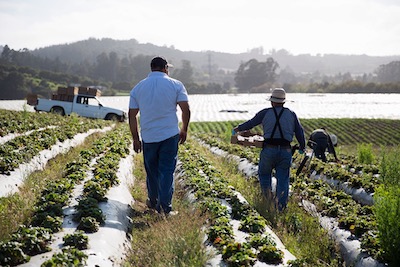 JSM Organics, a minority-owned, 60-acre farm in Aromas, CA, grows organic vegetables, cut flowers, strawberries, raspberries, and blackberries. They received a $5000 grant that will allow them to purchase a beneficial seed mix, pyro-weeder, beekeeping equipment, a quick-cut greens harvester, and a low-energy greens dryer. These purchases will help create a more efficient farm and reduce their carbon footprint. They will continue providing greens to the Fresh Approach/Freshest Cargo Mobile Market, which provides the low-income residents of East Palo Alto with affordable, organic produce on a weekly basis.
JSM Organics, a minority-owned, 60-acre farm in Aromas, CA, grows organic vegetables, cut flowers, strawberries, raspberries, and blackberries. They received a $5000 grant that will allow them to purchase a beneficial seed mix, pyro-weeder, beekeeping equipment, a quick-cut greens harvester, and a low-energy greens dryer. These purchases will help create a more efficient farm and reduce their carbon footprint. They will continue providing greens to the Fresh Approach/Freshest Cargo Mobile Market, which provides the low-income residents of East Palo Alto with affordable, organic produce on a weekly basis.
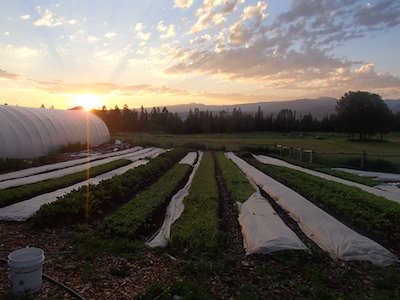 Huidekoper Ranch is a 1-acre farm in Wilson, WY, that produces organically grown salad greens, tomatoes, root vegetables, and microgreens. Their $3,400 grant will allow them to purchase two gothic-style caterpillar tunnels to help extend their growing season, increase food production, and add cover crops into the rotation to increase soil health. As the only farm growing vegetables commercially in the soil of Teton County, WY, they hope that their success will show others that high-elevation farming is possible and can help create a more sustainable community.
Huidekoper Ranch is a 1-acre farm in Wilson, WY, that produces organically grown salad greens, tomatoes, root vegetables, and microgreens. Their $3,400 grant will allow them to purchase two gothic-style caterpillar tunnels to help extend their growing season, increase food production, and add cover crops into the rotation to increase soil health. As the only farm growing vegetables commercially in the soil of Teton County, WY, they hope that their success will show others that high-elevation farming is possible and can help create a more sustainable community.
 Sisterland Farms, a 2-acre, woman-owned and trans person–operated farm in Port Angeles, WA, produces fruit, vegetables, and flowers, which they sell through a CSA and farmers markets. They received a $3,541 grant that will allow them to plant cover crops, start a community compost program, install rain barrels, create perennial hedgerows, and grow a food forest. These upgrades will help Sisterland improve their soil health, conserve water, and produce more food, allowing them to open their CSA to more families.
Sisterland Farms, a 2-acre, woman-owned and trans person–operated farm in Port Angeles, WA, produces fruit, vegetables, and flowers, which they sell through a CSA and farmers markets. They received a $3,541 grant that will allow them to plant cover crops, start a community compost program, install rain barrels, create perennial hedgerows, and grow a food forest. These upgrades will help Sisterland improve their soil health, conserve water, and produce more food, allowing them to open their CSA to more families.
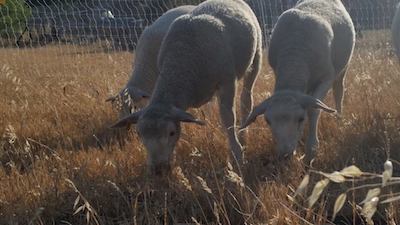 DoLittle Pastures, a 15-acre farm in Lacomb, OR, produces pastured meat and poultry, as well as woodland food and herbal products. Their $3,700 will allow them to purchase seeds, fruit trees, compost, and other supplies that will help them create a sustainable food forest, as they strive to provide affordable, nutritious food for their community. The forest will also function as a key component of their monthly potluck and herbalism gathering for women and children.
DoLittle Pastures, a 15-acre farm in Lacomb, OR, produces pastured meat and poultry, as well as woodland food and herbal products. Their $3,700 will allow them to purchase seeds, fruit trees, compost, and other supplies that will help them create a sustainable food forest, as they strive to provide affordable, nutritious food for their community. The forest will also function as a key component of their monthly potluck and herbalism gathering for women and children.
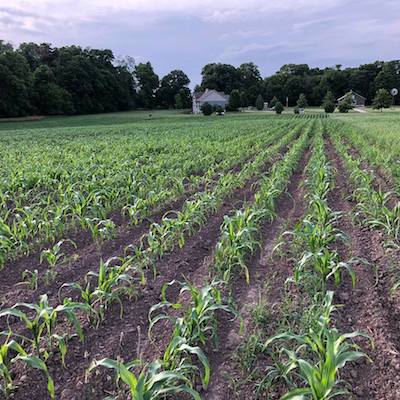 Funks Grove Heritage Farm is a 9-acre farm in McLean, IL, that produces small grains and fruit, while fostering a community grounded in compassion, innovation, and education. They received a $2,526.99 grant that will allow them to create habitats for beneficial insects and animals by installing 10 bee boxes, four bat boxes, two owl boxes, and two large plots of pollinator plantings. Encouraging beneficial insects and animals to visit their farm will help decrease pest pressure and enhance crop pollination. These additions will highlight the ecological importance of insects and animals and will be featured in future educational programming.
Funks Grove Heritage Farm is a 9-acre farm in McLean, IL, that produces small grains and fruit, while fostering a community grounded in compassion, innovation, and education. They received a $2,526.99 grant that will allow them to create habitats for beneficial insects and animals by installing 10 bee boxes, four bat boxes, two owl boxes, and two large plots of pollinator plantings. Encouraging beneficial insects and animals to visit their farm will help decrease pest pressure and enhance crop pollination. These additions will highlight the ecological importance of insects and animals and will be featured in future educational programming.
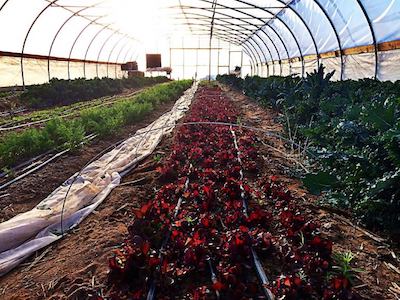 La Semilla Community Farm, a certified bee-friendly, nonprofit, 7-acre farm in Anthony, NM, produces vegetables, herbs, and honey. Their $4,196 grant will allow them to purchase trees and plants for a native vegetation buffer and windbreak. This buffer will help protect their gardens from wind erosion and pesticide use on neighboring farms, while providing habitat for beneficial animals and insects. La Semilla also hosts numerous school visits, and the buffer will be featured as a new component in their educational programming.
La Semilla Community Farm, a certified bee-friendly, nonprofit, 7-acre farm in Anthony, NM, produces vegetables, herbs, and honey. Their $4,196 grant will allow them to purchase trees and plants for a native vegetation buffer and windbreak. This buffer will help protect their gardens from wind erosion and pesticide use on neighboring farms, while providing habitat for beneficial animals and insects. La Semilla also hosts numerous school visits, and the buffer will be featured as a new component in their educational programming.
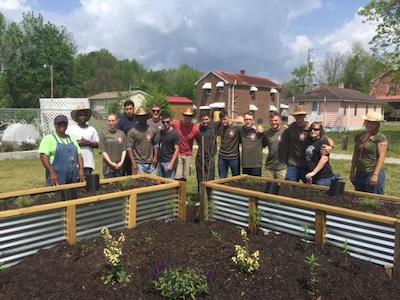 Veteran’s Employment Base Camp (VEBCOG) is a nonprofit organization designed to reintroduce unemployed, disabled, and homeless veterans back into the workforce as productive, employable individuals. Located in New Bern, NC, VEBCOG uses horticulture therapy to help rehabilitate veterans and grow organic fruits and vegetables to sell at farmers markets and distribute to disabled veterans. They received a $4,400 grant that will allow them to purchase two Slovenian beehives, which are more accessible to disabled beekeepers. The hives will be included in future farm tours to help encourage others to take up urban beekeeping.
Veteran’s Employment Base Camp (VEBCOG) is a nonprofit organization designed to reintroduce unemployed, disabled, and homeless veterans back into the workforce as productive, employable individuals. Located in New Bern, NC, VEBCOG uses horticulture therapy to help rehabilitate veterans and grow organic fruits and vegetables to sell at farmers markets and distribute to disabled veterans. They received a $4,400 grant that will allow them to purchase two Slovenian beehives, which are more accessible to disabled beekeepers. The hives will be included in future farm tours to help encourage others to take up urban beekeeping.
If you’d like to keep up with these farms throughout the year, be sure to sign up for our newsletter!
Small farmers are masters at making every dollar count. By providing farms like these with grants, we’re able to make big impacts on communities throughout the United States. If you’d like to join the FruitGuys in supporting small farms, please consider donating.
Jordan Charbonneau is an organic farmer and writer from West Virginia. She holds degrees in ecology and environmental humanities from Sterling College in Vermont.



